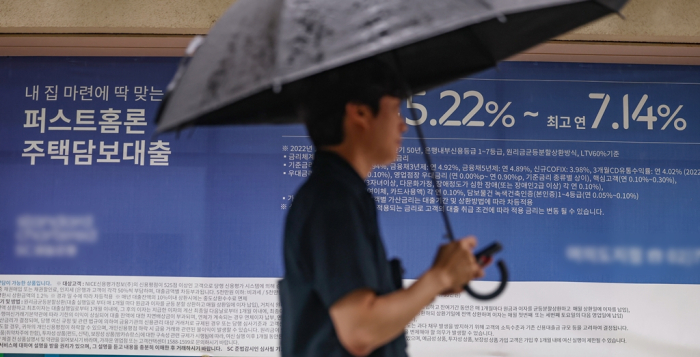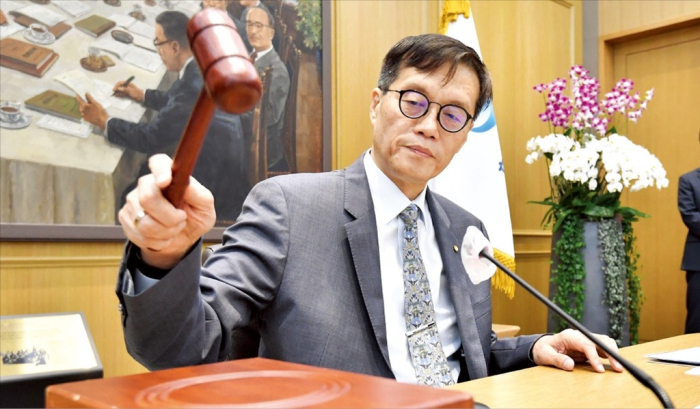Economy
Korea Inc.’s record short-term borrowing raises specter of debt overhang
Amid a streak of BOK rate hikes, companies are turning to banks for borrowing instead of debt issues
By Oct 18, 2023 (Gmt+09:00)
3
Min read
Most Read
LG Chem to sell water filter business to Glenwood PE for $692 million


KT&G eyes overseas M&A after rejecting activist fund's offer


Mirae Asset to be named Korea Post’s core real estate fund operator


StockX in merger talks with Naver’s online reseller Kream


Meritz backs half of ex-manager’s $210 mn hedge fund



South Korea’s short-term corporate loan growth is picking up at a fast pace, stirring concern among some analysts who see parallels to the 2008 global financial crisis, when large debts made Asia's fourth-largest economy vulnerable to a downturn.
Korean businesses’ short-term borrowing subject to repayment within a year reached a record high of 601.8 trillion won ($444 billion) as of the end of June, Bank of Korea data showed on Tuesday.
That’s up 12.6% from 534.2 trillion won in the year-earlier period and a 54.7% increase from the end of 2019, prior to the outbreak of the COVID-19 pandemic.
Corporate debt, or non-financial business debt, includes corporate debentures and bank loans.
Short-term corporate borrowing from banks and other financial institutions stood at 543.6 trillion won at the end of June, up 10.5% from 491.9 trillion won a year earlier. Short-term corporate bond issues reached 58.2 trillion won, up 37.6% from 42.3 trillion won.
Short-term debt accounted for 23.5% of companies’ total borrowing of 2,561 trillion won at the end of June.
The proportion marks the highest since 2008 when the ratio stood at 23.9% amid a global financial crisis. It is higher than Italy’s 20.98% – a country with a similar economic size to Korea. Japan, Korea’s closest neighbor, posted a short-term corporate debt ratio of 1.27% at the end of June.

BORROWING FOR OPERATING FUNDS
The central bank said companies mostly used short-term borrowing for operating funds.
Taeyoung Engineering & Construction Co. said in a regulatory filing last month that it borrowed 190 billion won in short-term loans from banks for business operations.
Hotel Shilla Co., Ildong Pharmaceutical Co. and IS Dongseo Co. also said their short-term loans are intended for business operations.
“Given the rise of short-term corporate debt, a temporary clog in their cash flow could easily lead to a crisis,” said Seok Byoung-hoon, an economics professor at Ewha Womans University.
BOK RATE HIKES PROD FIRMS TO TURN TO BANKS
Amid a streak of the central bank’s policy rate hikes, Korean businesses are increasingly turning to banks for borrowing, rather than issuing bonds at higher interest rates.

Analysts said the government’s determination to contain rising household debt could also create a “balloon effect,” as banks instead extend lending to companies.
Banks’ corporate loans have been on an ascending trend, rising from 7.45 trillion won in April to 11.32 trillion won in September.
Some companies opt to issue rights to service maturing debt.
SK Innovation Co. recently carried out a rights offering amounting to 1.15 trillion won, of which 315.6 billion won will be used to repay debt.
CJ CGV also said it will use about half of its recent rights offering of 410 billion won to repay maturing debt.

“If the Bank of Korea raises its policy rate by 0.25% from the current level, a number of companies will find it hard to pay the interest on their debt,” said a Federation of Korean Industries official.
Prof. Seok at Ewha said that even a good company could face default if it fails on its debt restructuring due to a short-term credit squeeze.
A BOK official said it may take time before the central bank to work out measures to improve situations on the corporate front given the different characteristics of corporate debt.
Write to Jin-gyu Kang at josep@hankyung.com
In-Soo Nam edited this article.
More to Read
-
 EconomyKorea’s household, business loans on upswing in September
EconomyKorea’s household, business loans on upswing in SeptemberOct 12, 2023 (Gmt+09:00)
2 Min read -
 Central bankBOK chief’s top mission: Soft landing for household debt
Central bankBOK chief’s top mission: Soft landing for household debtAug 24, 2023 (Gmt+09:00)
2 Min read -
 Central bankBOK warns of household lending risk on growth, inequality
Central bankBOK warns of household lending risk on growth, inequalityJul 17, 2023 (Gmt+09:00)
3 Min read -
 Central bankBOK keeps door open for another rate hike on Fed, debts
Central bankBOK keeps door open for another rate hike on Fed, debtsJul 13, 2023 (Gmt+09:00)
3 Min read
Comment 0
LOG IN


